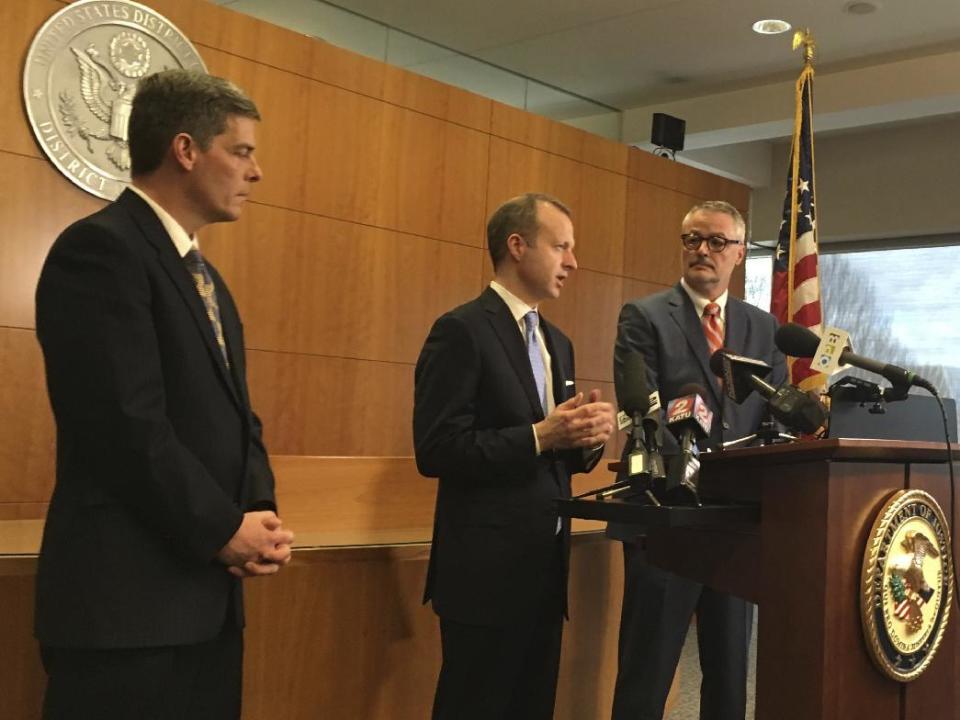Jury convicts 2 of conspiracy in Oregon ranching standoff
PORTLAND, Ore. (AP) — A jury on Friday convicted two men of conspiracy to impede federal officers during last year's high-profile armed occupation of a wildlife refuge in Oregon in a protest over control of Western lands. They face possible sentences of years in federal prison.
The verdict handed prosecutors some measure of redemption after they failed to convict occupation leaders Ammon and Ryan Bundy and five other occupiers in a trial last fall involving the takeover of Malheur National Wildlife Refuge, a federally owned remote bird sanctuary about 290 miles southeast of Portland.
Dozens of people, including some government informants, occupied the refuge from Jan. 2 to Feb. 11, 2016. They were allowed to come and go for several weeks as authorities tried to avoid bloodshed seen in past standoffs at Waco, Texas, and Ruby Ridge, Idaho.
The Bundys and other key figures were arrested in a Jan. 26, 2016 traffic stop outside the refuge that ended with police fatally shooting occupation spokesman Robert "LaVoy" Finicum.
After the verdict, assistant U.S. attorneys Ethan Knight and Geoffrey Barrow said they tried to do a better job of explaining to jurors why the FBI took and hands-off approach and how the standoff impacted refuge employees.
"But at the end of the day, the facts were essentially the same," Knight said. "And in our system, juries can reach different conclusions."
Jason Patrick and Darryl Thorn were found guilty of conspiracy and face up to six years in prison. Defendants Duane Ehmer and Jake Ryan were found not guilty of conspiracy but guilty of depredation of government property — for digging two trenches. Thorn was also convicted of possessing a firearm in a federal facility.
The men remain out of prison as they await sentencing May 10. Thorn faces up to five years on the weapons charge. Ehmer and Ryan face up to 10 years on the property charge.
U.S. Attorney for Oregon Billy Williams said the guilty verdicts send a message that it's not OK to take over buildings and property that belong to all Americans. He pointed out that nearly all the occupiers were from out of state.
"Folks in rural Oregon understand that if they have a disagreement there's a Democratic process in place for them to raise their concerns and challenge the government," he said. "They don't need to do it at the end of a gun."
Ehmer said after the conviction that he would head "home to go ride my pony for a couple months and then I'm going to take my mom fishing."
"Life goes on," he said. "I was there at the refuge and I rode my horse on the game refuge and now I'm a felon."
Patrick, part of the initial group that seized the refuge, said he plans to appeal. He said the "silver lining" in being found guilty is that the issues raised by the occupation will stay alive during the appellate process.
"Without a guilty verdict, it's all over and it goes away," he said.
The men had faced the same primary charge as the Bundy defendants — conspiring to impede Interior Department employees from doing their jobs at the refuge.
Prosecutors had said any rational person would be impeded from work when someone with a gun is sitting at their desk, as images of the occupiers showed they did during the standoff.
Defense attorneys countered that the occupation was a political protest against federal land policy and the imprisonment of two ranchers. They said there was no talk of disrupting someone's ability to work.
Testimony began Feb. 21 and no defendants took the stand. Ammon Bundy did testify about his motive for the occupation, saying he was "driven" to protest after learning that Oregon ranchers Dwight and Steven Hammond were heading back to prison a second time for setting fires that spread to public rangeland, including refuge property.
There was no dispute the group seized the refuge and established armed patrols, leading many to initially believe these were open-and-shut cases.
Stung by their defeat in the Bundy trial, prosecutors hired an outside consultant to help with jury selection for the latest trial. Barrow and Knight emphasized to jurors that a conspiracy doesn't require a formal or written agreement hashed out in secrecy.
Most occupiers of the refuge left shortly after Finicum's death, including the four defendants in the current trial, but a few holdouts remained for a few more weeks before surrendering.
A total of 26 people were indicted on the conspiracy charge. In addition to the 11 who appeared in the two trials, 14 pleaded guilty and charges were dropped against one man.
___
Follow Steven DuBois at twitter.com/pdxdub


